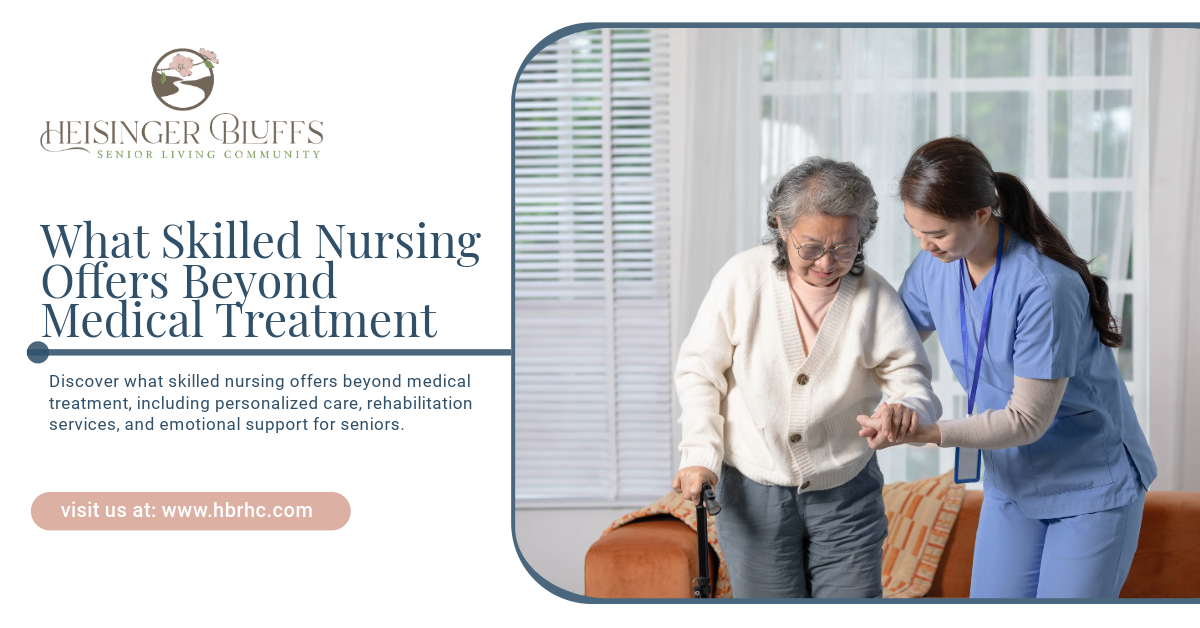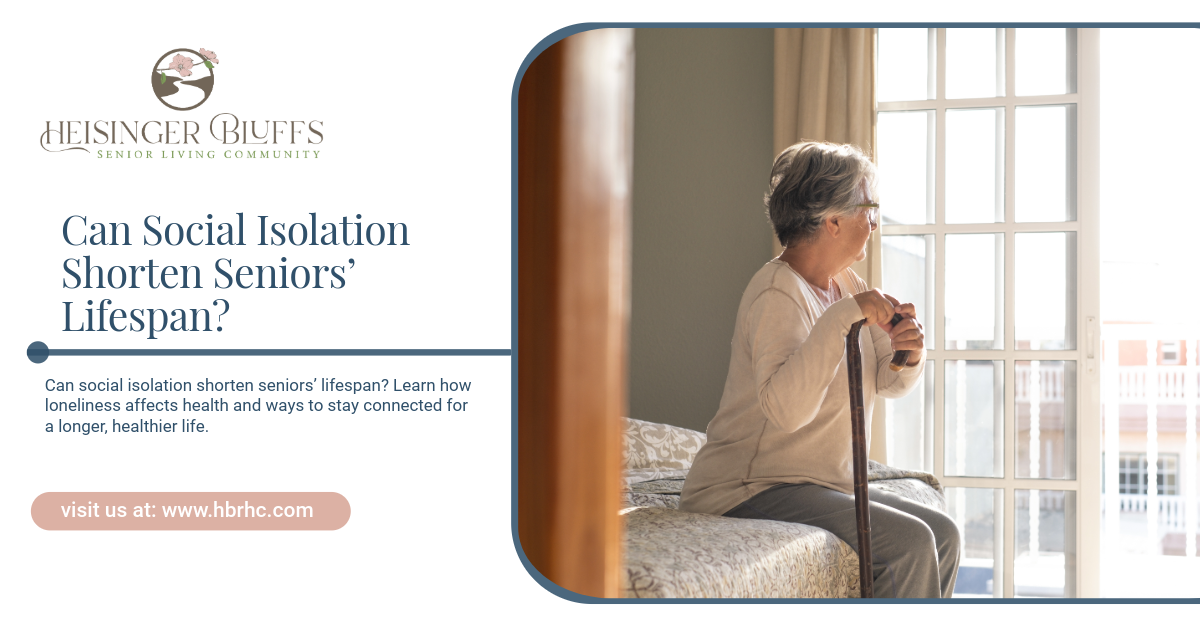What Skilled Nursing Offers Beyond Medical Treatment

What Skilled Nursing Offers
Skilled nursing care is a term that is often associated with medical services provided to individuals who require assistance with activities of daily living (ADLs) and healthcare needs. While the primary role of skilled nursing is to provide expert medical treatment and support, many senior living communities and healthcare facilities offer much more than just medical care. In fact, skilled nursing plays a crucial role in enhancing the overall well-being of seniors by providing a holistic approach to care that includes emotional support, rehabilitation, and a sense of community.
In this blog post, we’ll explore the many benefits and services that skilled nursing offers beyond medical treatment. From rehabilitation and therapy services to emotional support and social engagement, skilled nursing can greatly improve the quality of life for seniors.
1. Personalized Care Plans
One of the primary aspects of skilled nursing care is the creation of personalized care plans. These care plans are tailored to meet the unique needs of each resident, addressing both medical and non-medical aspects of care. A personalized care plan ensures that seniors receive the appropriate level of care, including assistance with daily activities, medication management, and rehabilitation services.
What’s included in personalized care plans?
- Health assessments: Regular evaluations of physical health to monitor chronic conditions and adjust care plans as needed.
- Daily care assistance: Help with daily tasks such as bathing, dressing, eating, and mobility.
- Behavioral and cognitive support: Tailored approaches for seniors with dementia, Alzheimer’s, or other cognitive impairments.
- Individualized goals: Specific objectives for rehabilitation or recovery, such as regaining strength after surgery or improving mobility.
The flexibility of these care plans ensures that each senior receives the right care based on their needs, allowing them to live as independently as possible while receiving the necessary assistance.
2. Rehabilitation Services
Skilled nursing is not just about medical treatment; it also plays a pivotal role in helping seniors recover from surgeries, injuries, or health setbacks through rehabilitation services. These services help seniors regain their strength, mobility, and independence, improving their overall quality of life.
Types of rehabilitation services often provided in skilled nursing:
- Physical therapy (PT): Focused on improving mobility, balance, strength, and coordination. Physical therapy can be especially helpful after surgery or injury.
- Occupational therapy (OT): Assists seniors in performing daily tasks independently by helping them improve their ability to dress, cook, bathe, and manage other activities of daily living.
- Speech therapy (ST): Designed to help seniors who have difficulty with speech, language, or swallowing as a result of a stroke or cognitive decline.
These rehabilitation services are often provided on-site, allowing seniors to receive regular therapy sessions without having to leave the facility. For seniors recovering from a stroke, surgery, or illness, these services can make a significant difference in their ability to regain independence and lead an active lifestyle.
3. Emotional and Psychological Support
Skilled nursing care goes beyond treating physical ailments; it also includes emotional and psychological support. Many seniors who require skilled nursing services are dealing with complex emotions, including anxiety, depression, loneliness, or the stress of adjusting to a new living situation.
Ways skilled nursing facilities support emotional well-being:
- Counseling services: Professional therapists or counselors can provide individual or group therapy to help residents cope with feelings of sadness, anxiety, or loss. This is particularly important for seniors who have experienced significant life changes, such as the loss of a spouse or a decline in health.
- Support groups: Group therapy or support groups for seniors can create a sense of community where individuals can share their experiences, express their feelings, and receive encouragement from others who are going through similar challenges.
- Memory care: For residents with Alzheimer's or dementia, skilled nursing facilities offer specialized support and strategies to help manage confusion, agitation, and emotional outbursts.
By addressing the emotional needs of seniors, skilled nursing facilities foster a sense of security, well-being, and mental peace, which is essential for a fulfilling life.
4. Social Engagement and Community Building
Another significant benefit of skilled nursing care is the emphasis on socialization and community building. Loneliness and isolation are common issues among seniors, especially those living with chronic illness or cognitive decline. Skilled nursing facilities provide a safe and social environment where seniors can connect with others and form friendships.
Social engagement activities often available:
- Group activities and events: Many skilled nursing facilities organize group activities such as arts and crafts, game nights, music therapy, or movie screenings that allow residents to socialize while engaging in fun and stimulating activities.
- Holiday celebrations: Seasonal events and holiday celebrations are a great way to bring residents together and provide them with a sense of tradition and joy.
- Outings and excursions: Some facilities arrange regular outings to local attractions, museums, parks, or theaters, giving seniors the chance to experience new places and stay active in the community.
These activities help seniors stay mentally engaged, combat feelings of isolation, and build a sense of belonging within their community.
5. Spiritual and Religious Support
For many seniors, spirituality and religion are important aspects of life that provide comfort, hope, and a sense of purpose. Skilled nursing facilities often offer spiritual support to residents, accommodating their religious practices and ensuring they feel spiritually nurtured.
Spiritual services may include:
- On-site chapels or religious services: Regular services for different faiths, including Christian, Jewish, and interfaith services.
- Visitation from spiritual leaders: Many skilled nursing facilities have chaplains or ministers who visit residents to provide one-on-one spiritual guidance, prayer, or sacraments.
- Bible studies or discussion groups: Group sessions focused on spiritual growth, providing opportunities for residents to explore their faith in a group setting.
By addressing spiritual needs, skilled nursing facilities help provide comfort, peace, and support for seniors, particularly during difficult times.
6. Transportation and Mobility Assistance
For seniors with limited mobility or those who are unable to drive, skilled nursing facilities often provide transportation services to ensure that they can attend medical appointments, social outings, and other essential activities. This service is particularly important for seniors who do not have family members or caregivers available to transport them.
Types of transportation services provided:
- Scheduled doctor’s appointments: Transportation to and from medical visits ensures seniors don’t miss necessary healthcare appointments.
- Grocery and shopping trips: Some facilities offer regular shopping trips, ensuring that seniors have access to essentials and can maintain their independence.
- Social outings: As mentioned earlier, skilled nursing facilities often offer organized trips to local attractions, parks, or events, which allows residents to enjoy a change of scenery and participate in community life.
Transportation services enhance mobility and independence for seniors, helping them stay engaged and involved in their communities.
7. Access to Family and Caregiver Support
In skilled nursing facilities, family members and caregivers play a vital role in the care of their loved ones. Skilled nursing care providers understand the importance of family involvement and often offer resources and support to help families stay engaged in the care process.
Support for families and caregivers:
- Family counseling: For families struggling with the emotional challenges of caring for a loved one, counseling services can provide guidance and support.
- Caregiver education: Some facilities offer educational programs that help caregivers learn how to manage specific health conditions, understand medical treatments, and navigate the complexities of senior care.
- Regular communication: Skilled nursing staff often keep families informed about their loved one’s condition and care plan, ensuring they are involved and up-to-date with the resident’s progress.
This level of family involvement ensures that seniors receive not only expert medical care but also the emotional and psychological support they need from their loved ones.
8. Safety and Security Features
Beyond providing medical treatment, skilled nursing facilities are equipped with safety and security measures designed to protect residents and ensure their well-being. These measures are especially important for seniors who may have limited mobility, cognitive impairments, or medical conditions that require constant monitoring.
Safety and security measures include:
- 24-hour supervision: Skilled nursing facilities typically have staff available at all hours to respond to emergencies and monitor the well-being of residents.
- Emergency call systems: Residents can use call buttons or wearable devices to alert staff if they need assistance or are in distress.
- Secure environments: Many facilities have locked doors and secure exits to ensure that residents who may wander are protected, particularly those with Alzheimer’s or dementia.
These safety features help give families peace of mind, knowing that their loved ones are in a secure environment where their health and safety are prioritized.
Conclusion
Skilled nursing offers much more than just medical treatment. Beyond providing expert medical care, skilled nursing facilities offer a wide range of services that promote emotional well-being, social engagement, rehabilitation, and family support. By focusing on the holistic needs of seniors, skilled nursing care ensures that residents are not only treated for their medical conditions but also supported in living fulfilling, meaningful lives.
At Heisinger Bluffs, we are proud to provide skilled nursing services that go beyond medical treatment. Our compassionate team focuses on providing personalized care, emotional support, and social engagement to ensure that every resident thrives in a safe and nurturing environment.
Frequently Asked Questions
What is the difference between skilled nursing and assisted living?
Skilled nursing provides 24-hour medical care and rehabilitation services for seniors with complex medical needs, while assisted living offers help with daily activities such as bathing and dressing, but without round-the-clock medical care.
How does skilled nursing support seniors with dementia or Alzheimer’s?
Skilled nursing facilities provide specialized memory care services, including tailored care plans, cognitive therapy, and a secure environment to ensure the safety and well-being of seniors with dementia or Alzheimer’s.
Are rehabilitation services available in skilled nursing facilities?
Yes, skilled nursing facilities offer physical, occupational, and speech therapy services to help seniors recover from surgery, injury, or illness and regain their independence.
Sources:
- https://www.cdc.gov/cdi/indicator-definitions/older-adults.html
- https://www.verywellhealth.com/geriatric-physical-therapy-5189469
- https://www.healthdirect.gov.au/depression-in-older-people
- https://www.nhs.uk/mental-health/feelings-symptoms-behaviours/feelings-and-symptoms/loneliness-in-older-people/











